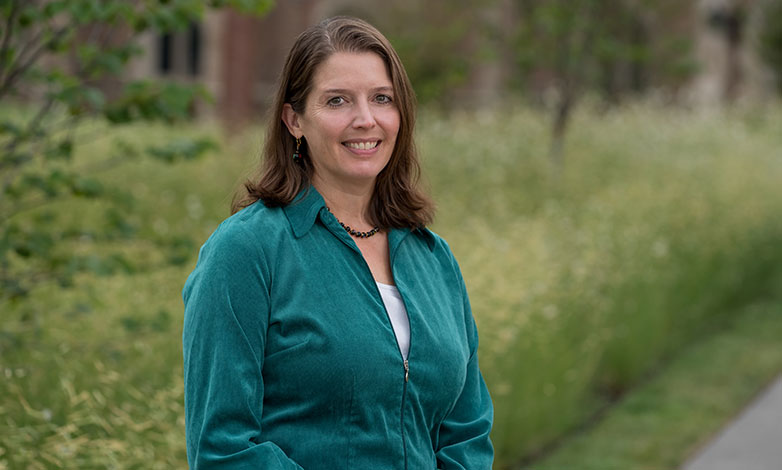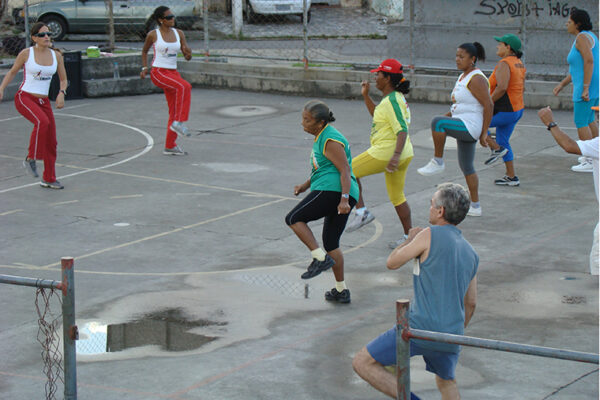
In a groundbreaking move to combat rising maternal deaths, Missouri’s Medicaid program began covering doula services statewide Oct. 2. The policy change was driven by the Center for Advancing Health Services, Policy & Economics Research (CAHSPER) at Washington University in St. Louis’ Institute for Public Health and other community health leaders who called for innovative solutions to address Missouri’s high maternal mortality rate.
This temporary, emergency expansion of coverage aims to improve maternal health outcomes, especially for low-income and minority populations. A permanent rule is expected to be finalized within six months.
“This isn’t just a health-care issue — it’s about addressing social and racial disparities that have existed for generations,” said Abigail R. Barker, CAHSPER’s associate director for policy partnerships. “By expanding doula care through Medicaid, we’re building a system where every woman — regardless of income or background — has the support she needs to thrive.”
The comprehensive program provides pregnant and postpartum women with health literacy and nutrition education, referrals to community resources, guidance on birth planning and non-medical support during labor, while respecting personal and cultural needs. Postpartum care includes education on well-woman care, family planning, mental health screening, parenting skills and breastfeeding support.
A 2022 policy brief co-authored by CAHSPER and community doula leaders was instrumental in Missouri’s decision to expand doula services under Medicaid. It highlighted the critical role doulas play in supporting maternal health, particularly in high-risk pregnancies, and called for immediate action to expand access to these vital services.
Missouri’s maternal health crisis
The statistics are alarming: Between 2017 and 2021, Medicaid-insured women in Missouri were seven times more likely to die within a year of pregnancy than those with private insurance, according to a report from the state’s Pregnancy-Associated Mortality Review program. Black mothers were 2.5 times more likely to die than white mothers, with many deaths deemed preventable.

Missouri has higher-than-average rates of smoking and substance abuse, and cardiovascular disease and mental health conditions are leading causes of maternal death. “These issues are compounded by poverty, limited access to health care and the legacy of historical racism,” said Barker, a research associate professor in the Brown School who helped lead the effort. “St. Louis and Kansas City have a long history of redlining and gentrification, and those systemic issues continue to affect public health today.”
Missouri’s expansion of doula services builds on years of collaboration between WashU researchers and leaders of prominent doula organizations in St. Louis and Kansas City.
“Our goal is to connect policy experts with those doing the day-to-day work,” Barker said. “The challenge is turning real-world insights into meaningful policy. We try to bridge that gap, taking the issues raised by experts and translating them into actionable solutions.”
The 2022 policy paper outlined the benefits of doula care, making the case for reimbursement in Missouri. CAHSPER researcher Ethan Bradley, who earned a master’s degree in public health from the Brown School in 2022, served as lead author, supervised by Barker, and WashU Medicine newborn hospitalist Jesse A. Davis, MD, now chief medical officer and chief strategy officer of the St. Louis Integrated Health Network, served as senior author.
Two additional key collaborators were Hakima Payne, executive director at Uzazi Village in Kansas City, and Okunsola M. Amadou, founder and CEO of Jamaa Birth Village in Ferguson, the oldest community-based doula organization in the St. Louis region.
“This policy brief became the trusted, evidence-based document informing the entire state about the importance of doulas,” Amadou said.
The COVID-19 pandemic helped move the initiative forward; virtual meetings allowed leaders across the state such as Payne to join conversations they might not have attended otherwise.
“Hakima’s insights gave us a deeper understanding of what doulas do,” Barker said. “It made me realize we needed to explain that difference more clearly to policymakers who might think of a doula as just a supportive family member.”
In June 2023, Barker led a meeting with key leaders from Missouri’s largest doula organizations to agree on draft language for a state plan amendment. They worked to ensure the policy reflected community needs, defining what qualifies as doula care and ensuring fair compensation.
“It’s crucial to design policies that reflect the realities Medicaid recipients face while ensuring community organizations can participate meaningfully,” Barker said.
Barker brings a unique perspective as both a WashU researcher and an economic consultant for Missouri’s Medicaid program. “I have one foot in both camps. It’s not easy to get things across the divide between academia and state policy, but when we bring the right people together — researchers, policymakers and community experts — we can make real change.”
Barker invited doulas to Jefferson City, where she asked them to share their experiences with state officials. She facilitated conversations between the doulas and policymakers, ensuring their voices were heard. “Most of these policymakers work in offices in Jefferson City and don’t often get to hear firsthand stories, so when they do, it resonates.”
A lifeline for vulnerable women
Research has shown that doula involvement reduces cesarean sections and preterm births, increases birth weights, reduces complications and promotes breastfeeding — key factors in improving maternal and infant health.
Doula services don’t replace medical prenatal visits, but they are a powerful complement. Women on Medicaid often struggle to make the recommended 14 prenatal visits, with some not seeing a doctor until the last trimester of their pregnancy.
As non-clinical providers, doulas bridge the gap, offering emotional and practical support during pregnancy, translating medical jargon so that mothers feel empowered. Many women on Medicaid struggle to access reliable health information, a challenge further complicated by mistrust of the health-care system.
“Doulas can attend prenatal visits, helping to ensure that the mom feels comfortable with her provider and knows what’s going on,” Barker explained. “They can act as a translator for women who may feel intimidated or unsure of the right questions to ask. It also helps when the OB-GYN meets the doula, so everyone understands the doula’s role in supporting the mom.”
Doulas also visit new mothers at home to check for signs of postpartum depression, addiction or domestic violence — all of which are leading causes of death in the year after childbirth. Ongoing support is especially important for women without strong support systems, as they often face added stressors such as reduced work hours, lack of child care and financial uncertainty.
Culturally congruent care
In Missouri, organizations such as Jamaa Birth Village and Uzazi Village are leading efforts to provide culturally congruent care for Black women and other underserved populations.
“Black birthing persons need more than back rubs and hip squeezes to see them safely though the passage of pregnancy and birth; they need a trusted and relatable companion who can deliver care in a culturally appropriate context,” Payne said. “Black families need doulas that see, hear and understand them and that can help them navigate the murky waters of our current health-care system.”
People can find a doula through referrals from doctors, word of mouth or online resources such as the Missouri Community Doula Council. Medicaid coverage should increase access, providing more stable funding for doulas and making their care more available.
Implementing doula services
Missouri joins more than 15 other states, including neighboring Kansas, in funding doula services through Medicaid. Tracking metrics such as C-section rates, birth weights and maternal satisfaction will be key to evaluating the program’s success.
Barker will be working with the state to track outcomes of the new Medicaid policy. “We’re not just putting a policy in place — we need to ensure it’s working,” Barker said. “It’s about improving the lives of women across Missouri, and that means listening to those who are directly impacted.”


